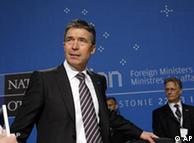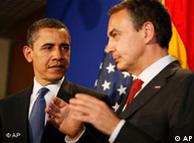TRANS-ATLANTIC RELATIONS | 13.09.2010
Tension in US-EU relations is real, but not new, experts say
For more or less the whole of the 20th century, Europe was the strategic center of the world, the continent that superpowers most coveted. When the Cold War ended, the US maintained strong ties with its NATO allies, and all the presidents from Bush senior to Bush junior habitually counted on the European Union for its strongest support.
But relations were damaged when the Iraq war divided the European governments, and the younger Bush chose to distinguish an 'alliance of the willing' from old allies who refused to pull their weight, notably France and Germany. President Obama - still very popular in Europe - was meant to reestablish old friendships, but, according to a provocative op-ed column in the New York Times written by Roger Cohen, the president is treating the EU with "benign neglect."
 NATO and the EU consistently vie for US attention
NATO and the EU consistently vie for US attention
"Central Command in Florida, running the Afghan war, rides roughshod over NATO," Cohen declared. "New Middle East peace initiatives are launched, new Afghan strategies decided, without even a nod to the Europeans who will pick up part of the tab and do part of the dying."
The piece argues that Obama, pursuing a radically new foreign policy, has reached out to China, Turkey and the Muslim world, and snubbed Europe. But is this true? And if it is, could the EU have even played a part in it?
Economic, rather than political significance
It's no secret that transatlantic relations have been slightly chilly in the two years of Obama's presidency. The US president ruffled feathers in Europe last May by backing out of a European summit in Madrid, and European diplomats have complained that under the Obama administration transatlantic issues have sometimes taken a backseat to US-Pacific region affairs.
Henning Riecke, program director at the German Council on Foreign Relations (DGAP), argues that Obama's interest in Europe was always there, but has waned for different reasons. "In the first year of his presidency, Obama went over to Europe a few of times," he told Deutsche Welle. "It ended in a huge climax of travelling, when he went to NATO, to the London financial summit, as well as to Prague, to give his arms reduction speech. That was quite impressive. One could ask, why didn't he continue to do so? And I would argue that has something to do with his domestic agenda - the financial crisis, health reform, and so on."
But Riecke admits that the move away from Europe is part of a long-term trend. "The Americans look at partners with regard to the capabilities they have," he said. "The EU is a strong partner economically, but when it comes to political questions - like Iran, coping with Russia, even the financial crisis, it was not easy to come to terms with the EU."
But that does not necessarily mean that the US has spurned Europe. "Is this a move away from Europe and a move to new partners?" Riecke asks. "I wouldn't say so. It is clear that the partnerships with China and India are important for the US, but when it comes to doing things together - for instance in Afghanistan, the Europeans are still the first-choice partners."
 Europe is still the partner of choice for US military missions
Europe is still the partner of choice for US military missions
The inertia of EU foreign policy
Perhaps it is the EU itself - as a diplomatic body - that has most hampered transatlantic relations. The EU's attempts to present itself as a unified bloc in its foreign relations are occasionally appear rather painstaking. Perhaps the US is simply tired of waiting while Europe tries to herd its diverse member states into a single strategy.
Ulrike Guerot, senior research fellow at the European Council on Foreign Relations, suggests that the problem is much older and deeper than Obama's tenure. "It's only been since 1989 or 1990 that the EU has tried to professionalize, or even 'Europeanize' its foreign and security policy," she told Deutsche Welle. "Since then there has always been this effort to be taken seriously by the US. The problem is that it never managed to, and then came the Iraq war, which completely split the EU apart."
In Bush's second administration, which began in 2004, the US did make clear efforts to recognize the EU as a serious player. But even then, the enduring tensions between NATO and the EU over security policy never failed to surface when actual issues arose. "Whenever the EU tried to establish its security policy, fears kept arising that it was trying to rival NATO and the US," said Guerot.
Just not enough hardware
Another problem is far more practical. "The EU does want to be more independent from the US in its foreign policy," said Guerot. "But it always comes up against the problem that it doesn't have the military capability to do so. That became clear in Bosnia. Whenever some kind of military intervention is needed, it can't be done without the US." This leads to persistent tensions within the EU about what should and shouldn't be done with US cooperation.
The US, for its part, is also consistently in its own quandary about the EU. "On the one hand the US is always very anxious when the Europeans want to do something on their own," Guerot said. "But on the other it wants the EU to develop more independence, because the US simply doesn't want to worry about places like the Balkans and Georgia anymore."
This, Guerot says, has been the central problem of US-EU relations ever since 1990, a year that marked the beginning of the decline of NATO and the start of the EU's constant struggle to assert itself.
Seen from this perspective, whether Obama skips the odd EU summit or snubs a dinner party at Nicolas Sarkozy's presidential villa once in a while will not greatly affect the underlying tensions.
Author: Ben Knight
Editor: Rob Mudge


No comments:
Post a Comment